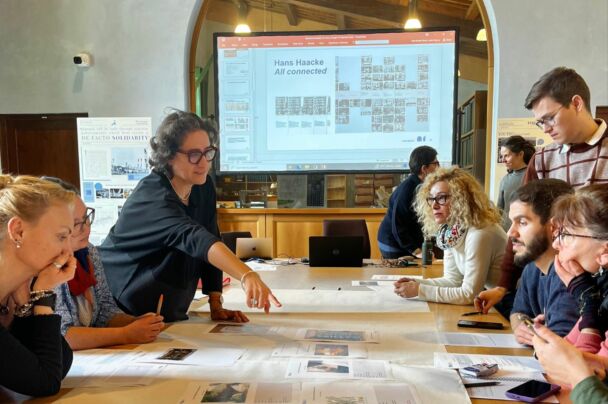Description
What does being European mean today?
How to introduce the concept of European identity at school?
How to familiarize pupils and students with the European Union and its Institutions?
Cultural heritage education offers effective strategies for answering these questions. And historical archives – such as the Historical Archives of the European Union (HAEU) in Florence, where this course takes place – are the best sites to learn about it.
Exploiting the methods and strategies of cultural heritage education, the HAEU archives become – from a place of storage and collection of documents – an open space for discussion, a place in which to discover an infinite heritage of stories.
Accessing the historical and cultural heritage preserved at HAEU allows reconstructing the history of the process of European integration on a double track: that of official history linked to the main events of European history, and that of personal history linked to men and women whose choices and initiatives played a decisive role within this process.
Merging individual and European history, school activities supported by archival sources have the double merit of engaging school learners with personal motivation and presenting the flow of the historical events that united all of us.
The course will instruct schoolteachers at all levels of education to use cultural heritage education in their classrooms to transmit the values of European citizenship to the younger generation.
Participants will engage in in-depth thematic moments, meetings, discussions, workshops, and practical activities designed to build a common consciousness, based on education in the values of peace, tolerance, and diversity.
Moreover, they will explore participatory approaches to reading sources using teaching materials created by the HAEU Education Program; and take part in the collective construction of the historical chronology of the European Union from the point of view of their own country.
Participants will also introduce themselves and their country from the history of family objects and create activities that promote effective debate as well as critical thinking about awareness of one’s place in history and the meaning of being a European citizen today.
All methods and activities will support the sharing of inclusive best practices and provide plenty of occasions for active and creative learning methods.
By the end of the course, participants will know how to work with archival sources by experimenting with various didactic uses for different levels of education.
They will master the basics of an innovative method for teaching history that will allow them to bring their learners closer to the history of European integration, and more familiar with the concepts and values behind European citizenship.
Concept by: Educational Programme of the Historical Archives of the European Union
What is included
Learning outcomes
The course will help the participants to:
- Explain the historical process of European Union integration through engaging and innovative activities;
- Use archival sources for educational design on European citizenship;
- Have a better understanding of EU institutions and how they work;
- Raise awareness of the impact of the EU on the daily lives of its citizens;
- Promote common European values and heritage;
- Promote a collaborative and supportive attitude in a multicultural environment.
Tentative schedule
Day 1 – Course introduction
- Introduction to the course, the school, and the external week activities;
- Icebreaker activities;
- Presentations of the participants’ schools.
Archiving European historical and cultural heritage
- What are archives? Open spaces for discussion and containers for stories;
- Dialoguing with the archivist;
- The journey of a source from creation to dissemination;
- Visit the repositories of the archives.
Day 2 – European identity: activities for schoolteachers
- Activity. European integration: Constructing a chronology through archival documents;
- Activity. Merging personal and family history in European integration;
- Workshop. Self-narration with family objects.
Day 3 – Educating European citizenship
- The Maastricht Treaty;
- Promoting common European rights and values;
- What does it mean to be a European citizen today?;
- Workshop. The simulation of a “euro demonstration”.
Day 4 – Europe and the Europeans
- The functioning of EU institutions through Institutional Funds;
- Pioneers, visionaries, and protagonists of the European integration process through Private Funds;
- Activity. The educational use of multilingual sources to tell European integration;
- Workshop. The simulation of a European parliamentary debate.
Day 5 – Active-learning strategies for teaching the history of European integration
- Teaching European history through an autobiographical interview;
- Methods and tools for active learning with creative languages (music, body expression, theater, visual arts);
- Workshop. Designing an educational activity with the explored methodologies.
Day 6 – Course closure and cultural activities
- Course evaluation: round-up of acquired competencies, feedback, and discussion;
- Awarding of the course Certificate of Attendance;
- Excursion and other external cultural activities.




